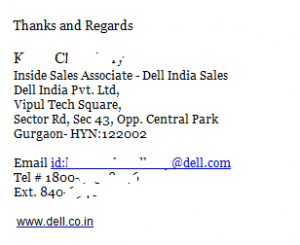Customer Service would easily be one of the most oft used(and abused) words in Business. For some people, customer service means giving their customers the kind of experience they would like to get (as a customer) but for others(majority?) it’s a mere formality, a lip service that you have to offer just for the sake of it.
While customer service in itself is a big subject comprising numerous things including principles, processes and much more, there’s a particular thing that I feel is amiss especially when it comes to online businesses, i.e. Personal Touch.
Personal Touch in customer service for online businesses is according to me a great value add given the fact that unlike offline businesses the customers are not talking to a company rep face to face or they can’t talk at length(or decide to wait in the company’s office) till their issue gets resolved. In fact Customer Service, especially over email, which is the most prominent way of offering Customer Service/Support is by design(asynchronous) a customer-unfriendly method. Given the fact that instead of talking to someone in person or over phone you are literally talking to a computer and unless the guys at other end make some real effort to add some personal elements things are bound to not be smooth.Adding Personal Touch to any non-verbal communication not only helps build credibility/trust but also ensures smooth resolution of any issues that a customer might have.
Over the last few months I’ve run into(online) customer service reps of various services including E-commerce and Mobile operators and almost NONE of them have what one can say Personal Touch in their customer service. As expected, almost all of them just work on a few standard templates which their customer service reps copy and paste. What further intrigues me is the fact that contrary to being Personal some of these online businesses try to be the opposite i.e. being as impersonal as they can be.
While this reply 
is still acceptable, these ones


are completely unacceptable.
I completely fail to understand what is the ingenious thought behind hiding the identity of the person who is responding to these emails. Could it be the CEO/CTO/CFO himself?
Not only is the case of missing identity a big barrier in building any sort of rapport with the business it also complicates things as the customer never gets to know who was the person whom they last spoke to(over mail), who are they talking to now and how much do they already know about their issue.
It’s not Rocket Science that small things like how your customer service team addresses their customers (Dear Customer Vs Dear Mr Dhingra), the tone/format in which they talk or type emails(Pre-decided formats or customized replies), how they sign off their emails(Customer Service, XYZ.com or Shantanu, Post Sales Support, XYZ.com, Email:-, Ph:-) matter a lot. They especially matter a lot when you are an online business and even more so when you are just starting up. BTW Dell India is an exception in this regard(at least)

Isn’t it great to actually see the “Full Name”(unlike just the first name) of the person who just mailed you back?
Isn’t it re-assuring to know that you also have their professional email id, telephone number and even extension in their email signature?
Besides other things, businesses should realize that by adding “Personal Touch” in their customer service, not only can they solve customer vows more quickly and efficiently, they can expect to get more/repeat business from them.
So having said all that, does your Customer Service have enough Personal Touch?





